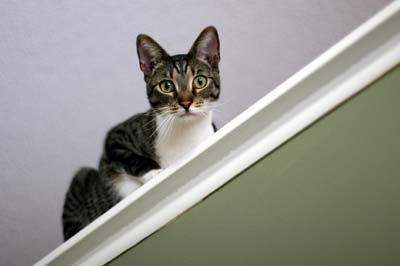
It happens so often that veterinarians have actually given it a name – high-rise syndrome. This term refers to cats falling from heights of over two stories, often from the windows or balconies of high-rise buildings.
While it’s true that cats can survive falls from great heights, as the recent story of Gizmo reminds us, it’s not a chance anyone would want to take.
Why do cats can fall from high places?
- Cats have the ability to ignore distractions when they’re fixed on prey – such as a bird – and may stumble or leap from a balcony or ledge without regard for the height.
- They may jump for an open window from indoors without being able to see what’s on the other side.
- They can squeeze through gaps that may surprise you, and find themselves on the wrong side of gravity.
But since cats have nine lives, it’s all good – right?
No. There are several reasons that cats fare better than many creatures when falling from great distances:
- The righting reflex, which allows cats to orient themselves as they fall, is the reason that “cats always land on their feet” – although the expression isn’t completely accurate there are times when they don’t.
- They have a low terminal velocity – that is, the speed at which the downward pull of gravity is equal to the upward wind resistance, holding their speed steady – of 60 mph (97 kph) compared to, say, humans, at 120mph (193kph).
- They are light weight for their size, and able to completely relax as they fall, so they land “with the grace of a cat,” instead of rigidly.
Nowhere on that list is “multiple lives.”
While the survival rate for falls from great heights is higher than you’d think, there is a great risk of injury, such as broken bones, joint injuries, collapsed lungs and other internal injuries, and death – especially if the cat is not treated immediately. It is dangerous, frightening and painful.
Tips to keep your cat safe if you live in, or are visiting, a high rise building:
- Make sure all window screens are intact.
- Block off small spaces, such as railings, with deck netting or wire mesh, available at any hardware store – if her head can fit between the bars, there’s a really good chance the rest of her can fit too, since cats do not have a collar bone like ours.
- Never allow your cat onto a balcony unsupervised, even for a moment – a moment is all it takes for her to take a misstep.
- If you can’t supervise but want to let your cat outside, you can use an outdoor enclosure – just make sure it is completely secure.
